Welcome to the Honors College
Freshman retreat at Montpelier is no walk in the park
JMU in the Community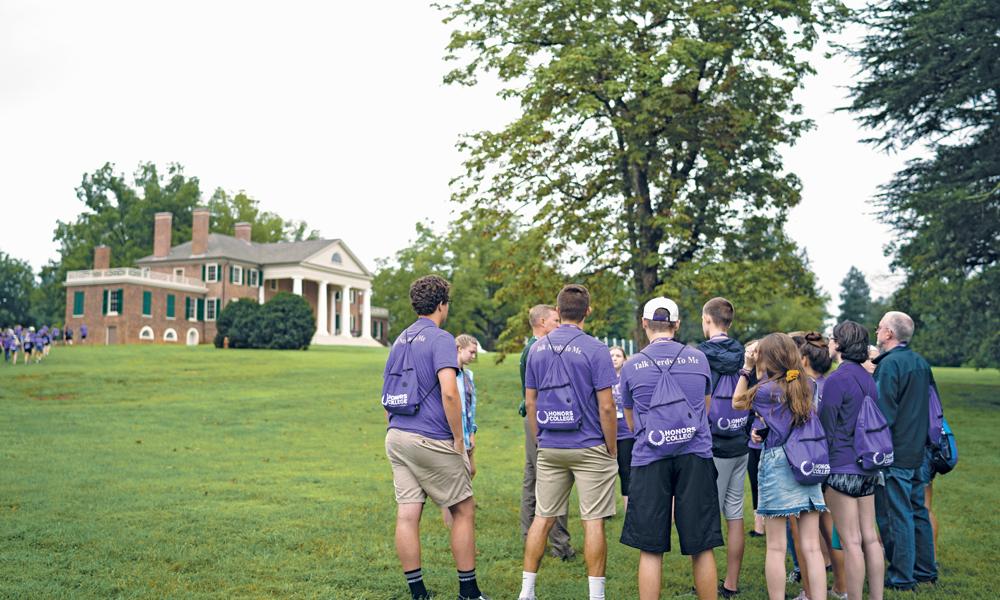
SUMMARY: At the inaugural Honors College Freshman Retreat at Montpelier, students were asked to engage, to work, to participate, to contribute and to challenge themselves.
from the Winter 2019 issue of Madison
By Sarah Chase (’17)
It’s 6:45 a.m. on Monday, Aug. 20, and first-year Honors College students are boarding buses to make the hourlong trek from JMU to Montpelier, the home of James Madison. Having met briefly during JMU move-in the night before, these 201 students don’t really know each other yet. Not only is this their first significant Honors College activity together; it’s also their first week as JMU freshmen.
As 8 a.m. approaches, a sudden incline on the gravel drive startles some of them awake. They open their eyes to the sight of lush green pastures along either side of the road and the historic mansion before them. It looks cool and refreshing outside, but once the buses stop and the students step out onto the grounds, they are greeted by high heat and humidity.
A white tent stands alone in a large field to the left of the house, offering refuge. Bradley Newcomer, dean of the Honors College, and Raquel Suarez, program director at the Robert H. Smith Center for the Constitution, introduce the students—who, just a few short months ago, were the top-performing seniors in their high schools—to the order and purpose of the day. The Honors College values ethical leadership, along with active and informed citizenship. Going into the day, Newcomer and Suarez hope the students see the connection between their personal academic goals and civic engagement through service and the study of history.
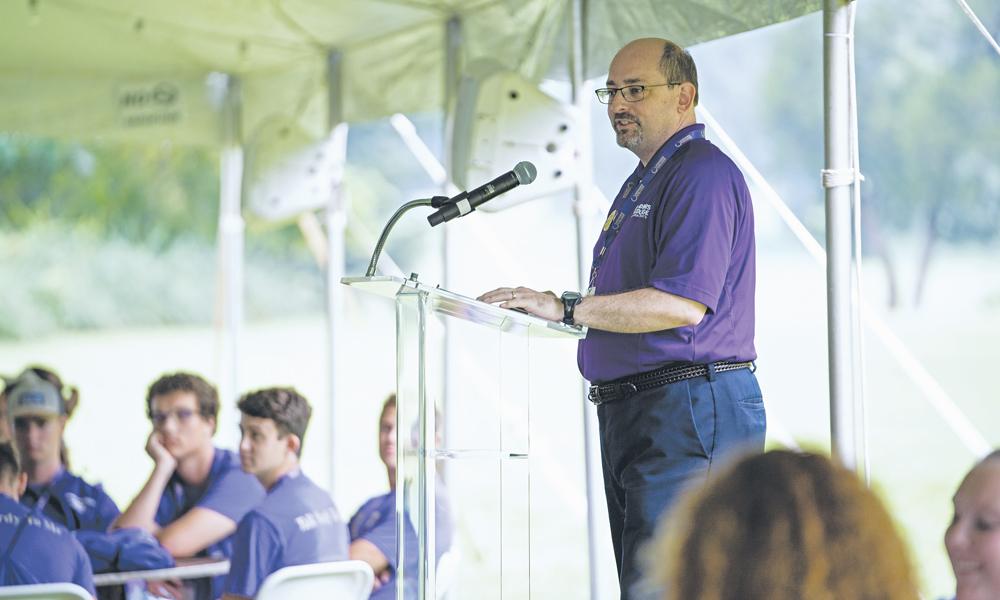 |
| Honors College Dean Bradley Newcomer welcomes the freshmen to Montpelier and outlines the plans for the day. |
As the official welcome comes to an end, 11 JMU faculty leaders and 11 Montpelier tour guides herd students into groups, make introductions and lead icebreakers. The silent tension of unfamiliarity starts to crack, slowly.
Each group of students will rotate through activity stations, so all will have much the same experience. Some start one of many service projects for the day: weeding, spreading gravel, laying mulch, shoveling dirt and moving old fence posts. As a National Historic Landmark, Montpelier is a living museum, and these Honors students are here to learn and to lend their muscle to the work that must be done to advance its history.
Their activity does not seem so noble in the moment as they trek across the grounds, their shoes and socks getting soggier with every step through the wet grass. They don work gloves, pick up shovels, grab buckets—and the work continues. Before long, perspiration slides down their foreheads and they start muttering.
“What are we even doing here?”
“I didn’t know we’d have to work.”
“I feel so disgusting right now.”
“My feet are soaked through.”
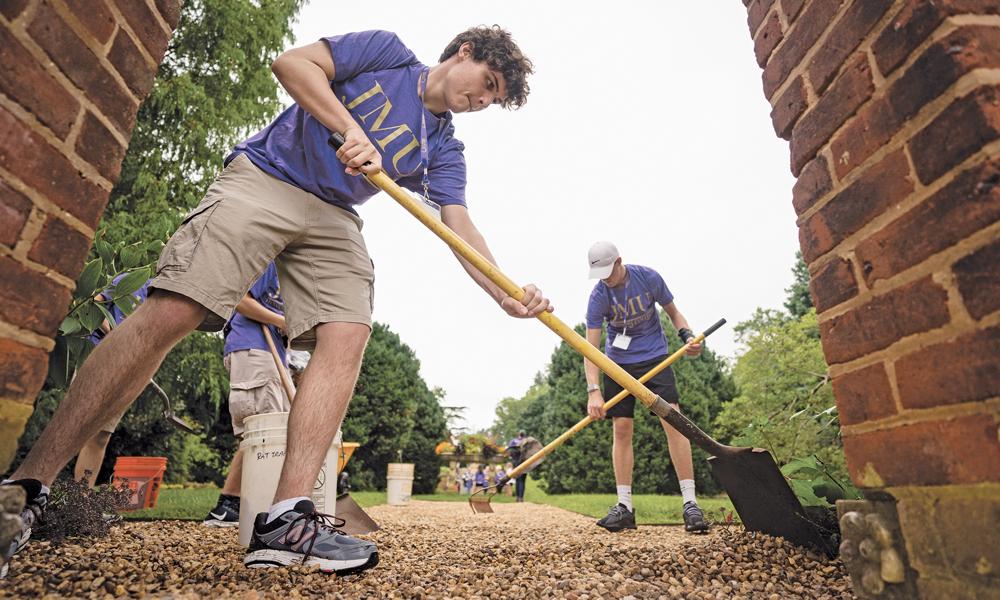 |
| A team spreads gravel in the garden area. |
Somber clouds hang low in the sky as their energy begins to dwindle. When 11:30 a.m. rolls around, it’s time for lunch. The mere mention of food has rarely been met with so much enthusiasm.
Sustenance and rest revive tired bodies as conversations perk up and laughter reverberates inside the tent. Although the morning has been challenging, it’s clear that everyone now feels more comfortable with each other. When the meal ends, students filter out of the tent as a second wave of students enters for lunch. It’s time for a tour of the grounds and house.
Tour guides expertly impart details of the estate. Students have prepped for the tour by reading Richard Brookhiser’s biography of James Madison and a guide contributed by the James Madison Center for Civic Engagement.
As students connect their reading to the scenery before them, an uneasiness disrupts their awe of the house. The beautifully refurbished and elaborate building shows clear evidence of the more than 300 people who were enslaved there by Madison and his family. Along with the Founding Father’s admirable achievements and enduring contributions to democracy—like drafting the Constitution and serving as the fourth president of the nation and secretary of state—the tour guides’ stories reveal some disturbing facts. In particular, students’ eyes widen when they learn that Madison never freed one of his slaves, not even on his death bed.
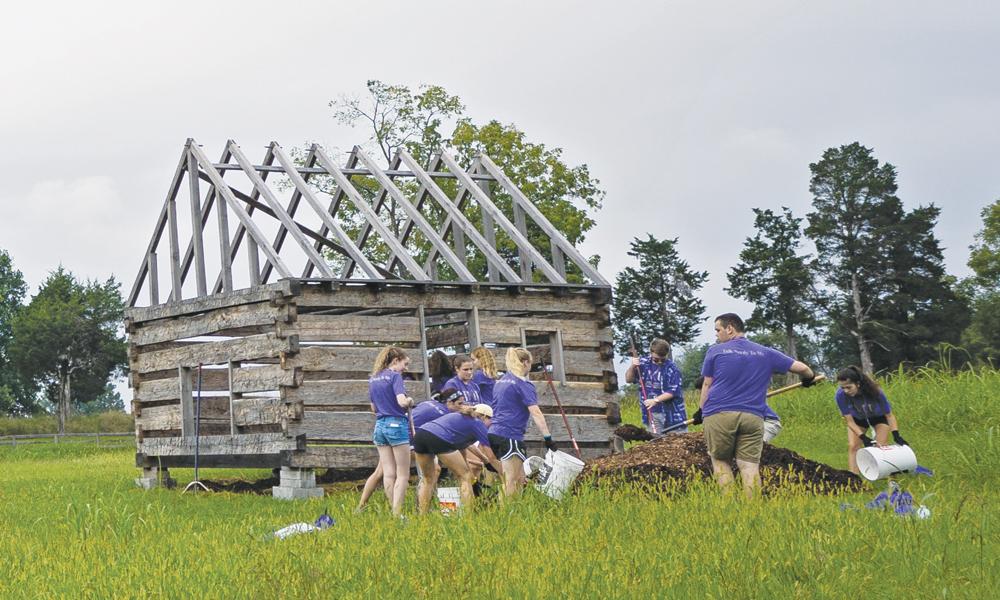 |
| A reconstructed slave quarters on the grounds receives the attention of an Honors College group. |
The inside of the house begins to feel as oppressive as the weather outside. Challenging questions hang in the air. Madison was a champion of liberty, but never freed his slaves … how do we make sense of that? Is it possible to believe in the equality of men yet not treat all men equally? Do you believe Madison was a good man, despite having owned slaves? Is it fair to both respect and criticize him?
Difficulties earlier in the day had prompted vocal complaints, but here, the reaction is thoughtful silence.
As the tour continues, the students proceed to the basement to The Mere Distinction of Colour exhibit. Beneath the house, the air is cooler and the rooms are brightened only by low lighting and the pattern of surrounding brick. Students watch a movie featuring descendants of the people enslaved at Montpelier, to whom the exhibit is dedicated. When the video stops, students are free to visit the other rooms and exhibits featuring dramatic readings of slaves’ letters, their personal belongings, and infographics and interactive screens with facts about slavery in the United States.
Students scratch bug bites from earlier in the day, tenting and airing out shirts still sweaty from before, as they sit down to read letters and look through artifacts. Everyone is taking it in separately, but one feeling is shared: They’re all uncomfortable.
The last part of the day features small-group discussions. A quick break for water and restrooms relieves the intensity. And soon, guides and leaders are sitting down in small circles to help students process the day. What motivated Madison? What duties and responsibilities were most important to him? What was Madison’s legacy? What does it mean to be Madisonian in the 21st century?
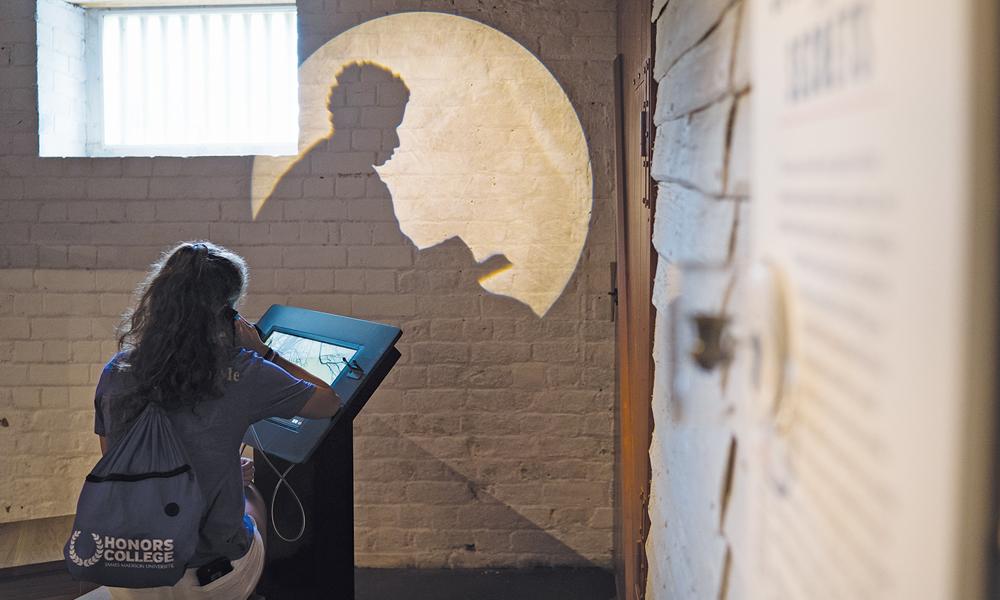 |
| An Honors College student takes in Montpelier's "The Mere Distinction of Colour" exhibit. |
Students now begin to engage, acknowledging that they didn’t know much about Madison prior to this retreat. Maybe it’s the water break and being in an air-conditioned room, or maybe it’s that these students operate best in small groups, but they have a lot of opinions. There is now a sense of knowing Madison, the man. Students recall walking through his library and hearing how over-prepared he was for every encounter he had.
“He was a model citizen who acted for change and liberty when others wouldn’t,” one student offers.
“He led from behind,” says another.
“Being Madisonian means being a different kind of leader, being able to change things when we see something wrong,” a freshman observes.
“Madison did his homework. He was informed, and I think we could do more of that,” says another.
|
The day has been long. It has been unsettling, unpredictable and upsetting, but equally thought-provoking and enlightening. |
As the discussion wraps up, it’s time for dinner. Evening is settling in. The weather has cooled and students sink deep into their chairs as they listen to an actor portraying Mr. Madison, the sage of Montpelier. After the dramatic presentation, Kat Imhoff, president and CEO of Montpelier, makes closing remarks.
Now it’s time to board the buses and make the drive back to campus. The day has been long. It has been unsettling, unpredictable and upsetting, but equally thought-provoking and enlightening. And students won’t be stepping into their residence halls until close to 9 p.m. Not even 24 hours after having moved onto campus, Honors College students have been asked to engage, to work, to participate, to contribute and to challenge themselves.
The reality is that these students are asked to give more from day one, because the responsibility of being an Honors student requires more. It won’t be easy, but it will be life-changing. Welcome to the Honors College.

